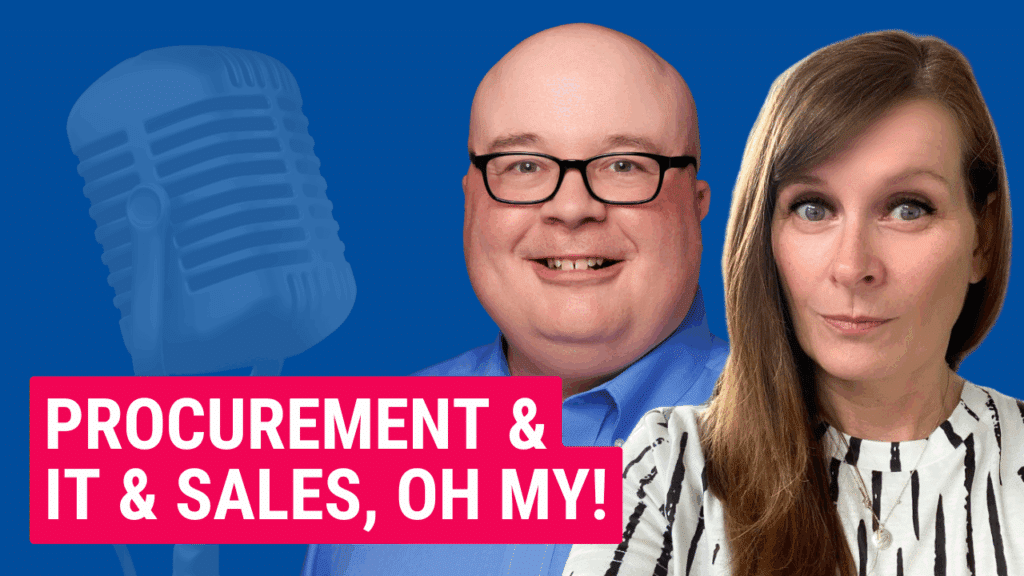What to do when your client contact isn’t the problem
Description

<figure class="wp-block-embed is-type-video is-provider-youtube wp-block-embed-youtube wp-embed-aspect-16-9 wp-has-aspect-ratio">
In this episode, Chip and Gini discuss how to handle situations when the problems affecting an agency’s client relationship stem from external contacts like procurement, IT, or the sales team.
They emphasize treating client contacts as allies and not enemies, and provide strategies to navigate bureaucratic hurdles and internal politics. The discussion covers creative problem-solving techniques such as using MSAs, having biweekly calls with VPs of Sales, and understanding cultural differences. The importance of having a collaborative approach and pre-building relationships to effectively manage challenges is also highlighted.
Key takeaways
- Chip Griffin: “Treat your client contact as an ally, not the enemy.”
- Gini Dietrich: “We have several clients who have procurement done in another country, and English is not their first language. And so we find that some of the barriers to success are not because of the things that we assume.”
- Chip Griffin: “When you run up against an obstacle, try to figure out is there a creative way that we can get from here to there?”
- Gini Dietrich: “We always ask what the threshold is for financial amounts because there’s usually an amount of money that your client contact can approve without it going to procurement or to their boss or whatever happens to be.”
Related
- How agencies should handle procurement and legal
- How to onboard new agency clients
- Getting agency-client contracts done right
The following is a computer-generated transcript. Please listen to the audio to confirm accuracy.
Chip Griffin: Hello and welcome to another episode of the Agency Leadership Podcast. I’m Chip Griffin.
Gini Dietrich: And I’m Gini Dietrich.
Chip Griffin: And Gini, I’ve got this, this invisible guy over here, and he’s telling me what we need to do for this show today. And, and we have to follow it to the letter if we wanna record.
Gini Dietrich: Oh, who is it?
Chip Griffin: I dunno, but if someone, someone is telling me that we need to, to record an episode about what to do when your problem isn’t the client contact for your agency, but it’s someone else, someone off screen who’s telling them what they have to do and it’s causing problems for your relationship.
Gini Dietrich: Oh, someone like procurement or IT?
Chip Griffin: Someone like procurement. Mm-hmm. IT, the sales team.
Gini Dietrich: Mm-hmm.
Chip Griffin: The CEO.
Gini Dietrich: Mm-hmm.
Chip Griffin: All sorts of people who may not be involved in any of the day-to-day work that our client contacts are doing, but they are just involved enough that they can cause trouble.
Gini Dietrich: Mm-hmm. Kind of like me having to tell a client’s VP of sales the other day that we’re not their local Kinkos.
Chip Griffin: Yes.
Gini Dietrich: Yeah. I actually used those words.
Chip Griffin: I mean, to be fair, FedEx Kinko’s now, so you’re, you’re dating yourself, but
Gini Dietrich: I, fair, yes, you’re right. But also it got the point across.
Chip Griffin: Yes, it got the point across, but, but did it resolve the situation or did they just say
Gini Dietrich: It did resolve the situation. Okay, good. Good. I think it made him mad, but he understood that we’re not here to just print the brochures for him.
Chip Griffin: Yeah. No, that is, that is not the role of an agency. But no, a lot of times we do have these, these pressures or our, or really it’s our client contacts who feel the immediate pressure, right? They get, they get told by procurement that they have to, to find a way to cut the budget with their agency. They get told by IT that, you know, you can’t do this with email or that with your website or those kinds of things, or there are all these extra hoops to jump through and there’s no budget to pay for all those extra hoops or, I mean, just any number of different things that, that we see as agencies that we have to find some way to deal with.
And it’s tough because when it’s our client contact, we can at least have a direct conversation. But when it’s someone who is, who is literally off screen, for most of us, since we’re doing these conversations typically by Zoom these days. Someone offscreen meddling is a lot harder to deal with. So, so what is your advice to an agency owner who says, look, I’ve, I’ve got these challenges and, and my client contact agrees with me, but, but how can I help them to get this across the goal line the way we need to?
Gini Dietrich: Yeah, it depends on what it is for sure. I mean, we’ve had the situation where procurement, of course, has wanted us to reduce fees. So then it’s a conversation with the client contact to say, Hey, listen, this is what they’re asking us for. That means we’re gonna have to take this, this, and this out of this scope of work.
Typically the client contact can influence that and go down and talk to procurement or send an email or do a support ticket or whatever it happens to be, to be able to influence that. And sometimes they can even elevate it or escalate it above to their supervisor or their supervisor’s supervisor. It just depends.
But that’s usually where, usually where we start is saying If we do this, this is what it, this is how it will affect the work that we’re going to do together. And this is what you can expect. And typically they’ll, they’ll go to bat for you. So I would start there for sure.
Chip Griffin: Right. I mean, I think that that fundamentally what you’re describing is, is treating your client contact as an ally, not the enemy.
Gini Dietrich: Yep.
Chip Griffin: And, and it is tough because sometimes when we, when we hear these things, it’s, it’s often, you know, we often put ourselves in the position of wanting to shoot the messenger because that’s who we’re, we’re talking to our client contact on a daily basis. And when they tell us, you know, these are the rules or these are the things we need to do, you know, we, we can get frustrated with them, but we need to remember.
Most of the time or many of the times, it’s not them. They, they have the same view we do. And so we need to try to figure out how we can work together to overcome their internal obstacle. And it, and it does mean that, you know, we may need to make some compromises ourself. We may need to, to invest a little bit more time and energy into helping things done.
And some of that may be uncompensated time. If needed in order to, to try to, to clear these hurdles. But they are necessary hurdles to clear. Otherwise we may not be able to achieve the results or we may have to, to eliminate some of our profit margin or any number of different problems that we may run into if we’re not willing to invest in the short term in overcoming those difficulties.
Gini Dietrich: Yeah. And I would say most of the time people are pretty reasonable. You can, you can say, and usually your client contact is gonna be like, Ugh, this is so frustrating. I can’t have you reduce the scope, right? Because we need to do these things and I’m held accountable to those results. And so, you know, so it, so the…It, it rolls downhill for sure. So usually they will go to bat for you and we’ve had a couple of examples where they’ve had to go to their supervisor and say, Hey, I need you to help me push this through. But for the most part, I think you’re right. If you can use your client contact as the ally, you can usually get





